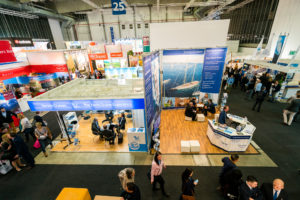The past 18 months have seen a huge change in how events are hosted due to Covid-19 and the climate emergency. The implementation of new technology and using systems already in place to a fuller capacity has had a huge impact on the way businesses operate. In this article, we will discuss how in person events have changed, along with virtual and hybrid events.
What is needed for a successful virtual event?
The platform is important, but it is not the only consideration. If you are used to in person events, you’ve got to rethink and design your business for the virtual space. Hosting an in person event versus a virtual event are two very different things.
Virtual events succeed when they are short and snappy. Dynamic agendas are more successful using a panel to make it a dialogue and avoiding long monologues where possible.
With virtual events being so easy to access, often you will find more people attending, but also, more people dropping off if it does not hold their interest. Don’t dwell on low virtual turnouts , the benefit to having a small group is that you can have more meaningful conversations.
People are looking for valued engagement. Generate urgency for them to be live with you, create breakout groups and feedback sessions, resulting in a more successful event. Focus on those joining and be part of it to ensure it is a well-paced event. This will keep people from opting to watch the recording later rather than joining live.
What factors do event organisers need to take into account for a good technical experience?
Organisers need to understand the platform they are using really well. They should sign up to a software that their team is comfortable using. This will help eliminate hiccups when the event is live.
They should run demos to help familiarise themselves with the software and how it operates. People who try to convert the face-to-face structure directly into a virtual event will struggle.
Taking 30 people that would have been speaking at an in-person event will not flow the same way virtually. Instead, change the agenda and make it suitable for the online space before the promotion goes out.
Ask yourself a few simple questions when organising the event and make it clear to your clients how the virtual event will be structured: Is it content heavy? Is it interactive? Is it a webinar event?
Now that face to face events are coming back, what steps do organisers and attendees need to take to make sure experience safe and successful?
Clients need to make it clear to their attendees that they are working hard to make sure the event is as safe as possible. They can share with their attendees how they have been working with their suppliers and sponsors to make the event safe. They can highlight their Covid safety page; make it crystal clear in their communications that you are taking care of them. It is also important to take into account that some people might not be comfortable to return to in-person events just yet. For these people, make sure to supply an online live stream of the event so they can feel part of it too.
Advise for exhibitors:
Exhibitions are expensive and take a huge time commitment; the time for the staff to be there, the booking and customising of your stand, travel and accommodations etc. Exhibitors want to make sure that they are seeing a return on their investment. They need to build a strategy and share it with their team. They need to generate leads and convert sales; if you don’t have a sales process, you can seek expert advice to develop one in advance.
While part of your team is at the exhibition, communicate with those who are not there so they feel part of the event. Use them to post photos taken from the event for your social media and marketing.
An aspect that is commonly missed or done poorly is the follow-up process. You need to ensure you follow-up promptly, the sooner the better, as this keeps the interest spiked and looks more professional. Another important aspect is to reflect and review by arranging a follow-up with your team, discuss what went well and what could be done better next time.
Climate emergency; will there be less in-person conferences in the future?
One of the biggest changes will be in international conferences. Where it once was a norm to fly internationally to conferences, people will set up virtual conferences instead from the comfort of their own homes. This means people can be in different time zones virtually. This change will help bring more people together as it provides more opportunity and at the same time, dramatically decreases your carbon footprint.
Do hybrid events work? or do the people joining virtually have a sub optimal experience?
There are many different versions of hybrid models:
- A multi-hub event where people are feeding into it;
- A studio model where you have people in the studio only, then everybody else online;
- Highlight style, a live event occurs and then it is shown online to an audience.
A lot of models are constantly evolving and new ones coming to the market. A priority for event organisers is to make sure that online users aren’t an afterthought. Organisers need to appreciate that the in person attendee and the online attendee both carry equal importance.
However, both have separate needs which needs to be reflected in the agenda. For example, if you are holding a hybrid event which hosts a breakfast, this should only be available to those in person. Those online, will not be interested in watching a live streaming breakfast networking event. Instead, they should be all brought together once the meeting is underway. If in person attendees are given props, make sure the same props are posted to online attendees. Strategise what you want your attendees to do and when. This could be incorporated into a presentation that is shared with both in person and online users.
Why should SMEs invest in events?
Events are the number one offline activity that directors and key decision-makers use to raise awareness of their organisation. You don’t even have to create your own even, you can start a lot smaller by talking at or sponsoring an event.
Tying things together for multiple online exposure is the key. Recently AM Bid sponsored Josh Quigley who broke the Guinness World Record for the Greatest Distance Cycled in One Week. We covered his activity across the week, and then we hosted him on our very own LinkedIn Live about his experience.
Generally, diving into the deep end of events without experience is a high risk tactic, especially if you don’t have a large budget. If you are considering visiting a trade show, then why not visit it one year to gain an understanding of how it works, then prepare your team and exhibit the next year. This will give you an idea of the demographics, your target market, and your return on investment. Think low risk, how is the event going to generate content and help marketing campaigns? Will it generate meaningful leads for your company?
Should you use event professionals?
Event professionals understand pain points that clients have gone through and have learnt ways to best deal with them. Especially those you might have experienced during the pandemic. Working with an events professional can provide you with a greater understanding, as you might have underestimated how big the task actually is. Having a professional advise you provides you with security; they have experience in the field and work with multiple clients simultaneously. They work efficiently rather than an inexperienced employee taking on the challenge and frees them up to do their day job. At the very least, it would be beneficial to have an events professional in your network.
Event follow-ups and tips
Traditionally the follow-up carries a lot of weight. With the implementation of the virtual world, you can take advantage of pre-event sessions and pre-marketing. The follow-ups are vital, as this is the pipeline for future work. For example, if you talk to a client and put their details into your CRM system, make sure you contact them as soon as you can. If they don’t hear back from you regarding their query, they may forget the conversation or worse, associate your brand with a negative experience. Make sure to follow up straight away and in a focused and informative way, giving them the information they need. This will lead on to positive conversation, producing real outcomes as well as having a significant impact on your brand and reputation.
With thanks to Ruby Sweeney, Founder & Director – The Events Hub
